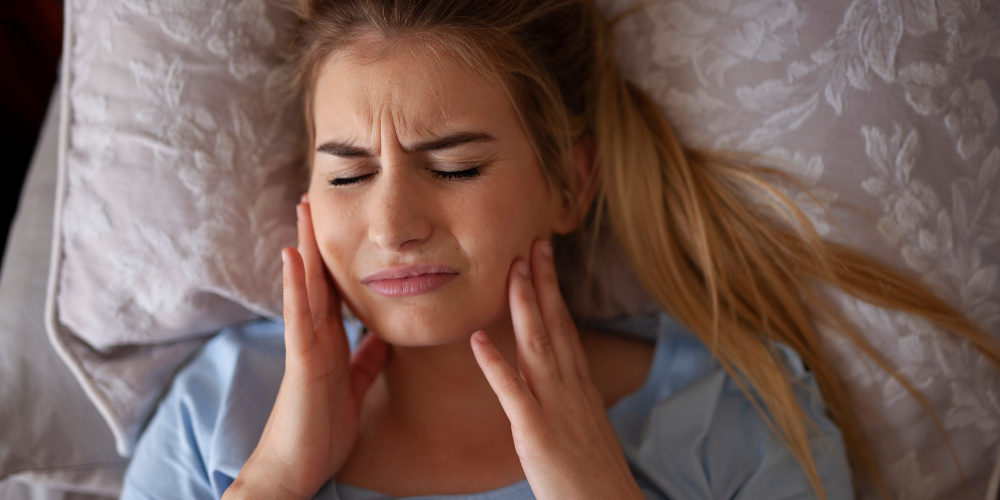“I grind my teeth.” This is a common statement heard by dentists, and many patients state it matter-of-factly with little concern that grinding your teeth could be a very bad thing. Teeth grinding is quite bad for you for a variety of reasons.
Not only can teeth grinding cause both pain and deterioration of the teeth. It can also indicate a serious underlying health condition.
Teeth Grinding Could Indicate an Underlying Health Problem
Dentists use one term to describe the phenomenon of both clenching and grinding of the teeth: bruxism. Bruxism leaves visible evidence inside the mouth, so your dentist is likely to point it out during a periodic evaluation. Many people wonder why bruxism is so common among American adults. While we do not understand all of the different causes of teeth clenching and/or grinding, one cause is very clear: Obstructive Sleep Apnea (or OSA).
Sleep apnea is a dangerous health condition that causes interruptions in breathing during sleep. When someone stops breathing, the oxygen levels in the bloodstream drop rapidly. Sleep apnea is linked to high blood pressure, stroke, obesity, chronic pain, and depression. Our bodies need oxygen to heal and repair themselves during sleep. When sleep apnea deprives the body of oxygen, managing medical problems becomes increasingly difficult.
One physiological reflex that results from a detected drop in oxygen levels in the brain is to bring the lower jaw up (toward the upper jaw) and even push it forward (toward the front of the face). This reflex tightens the tissues in the upper airway and helps the airway stay open to allow the flow of air and promote breathing. This reflex is a good thing. However, it has bad consequences. If a sleep apnea problem goes untreated, the body’s attempt to manage it can become very aggressive, causing extensive damage to the teeth and jaws.
If you show evidence of heavy bruxism, you should work with your dentist and medical doctor to determine whether you are at risk for sleep apnea and follow the steps necessary to diagnose and treat it.
Teeth Grinding Can Severely Damage Your Teeth
The heavy forces associated with bruxism are stronger than those the teeth are capable of withstanding. Teeth are covered in enamel, the hardest substance in the human body. However, the enamel is not impenetrable. When someone clenches or grinds their teeth heavily, the abnormally high forces cause friction between the upper and lower teeth, which gradually wears away the enamel.
Teeth grinding typically causes teeth that appear to be shortened, flattened, or chipped and jagged. This is not simply a cosmetic issue! As the teeth get shorter over time, the jaw muscles and joints are affected. Extensive dental treatment is necessary to repair the lost enamel.
Many people experience cracked teeth as the restful of heavy grinding. A cracked tooth is not only difficult to diagnose; it is also difficult to treat. Depending on the extent of the crack, the tooth could require a dental crown, a root canal treatment, or an extraction (or even, in some cases, all of the above).
These heavy forces can also damage the gums and bone surrounding the teeth. People with heavy bruxism tend to have a higher risk for gum recession and bone loss than someone who protects his teeth against grinding.
Teeth Grinding Can Cause Chronic Headaches
Many people suffer from painful headaches or facial tension as the result of teeth grinding. The muscles in the face, that bring the upper and lower jaws together, are skeletal muscles, just like those in the rest of the body. When we overwork these muscles, they become fatigued and sore.
Someone with heavy teeth grinding habit is likely to experience frequent headaches in the temples and forehead. Others have pain in their cheek and jaw muscles. Severe grinding can even lead to pain in the neck and shoulders.
Unfortunately, because this habit occurs during sleep, it is very difficult to address. The most effective measure against these headaches is wearing a protective nightguard to reduce the forces of these muscles. By separating the teeth, you can prevent full contraction of the jaw muscles.
More Questions about Teeth Grinding? Call Rockland Dental Today!
Call Rockland Dental Specialists today at (845)-259-2500 or contact us to schedule a consultation with our dental experts. We can assess your current situation for signs of teeth grinding. We will also help you take measures to prevent the dangerous side effects of grinding and protect your oral health for the rest of your life.



